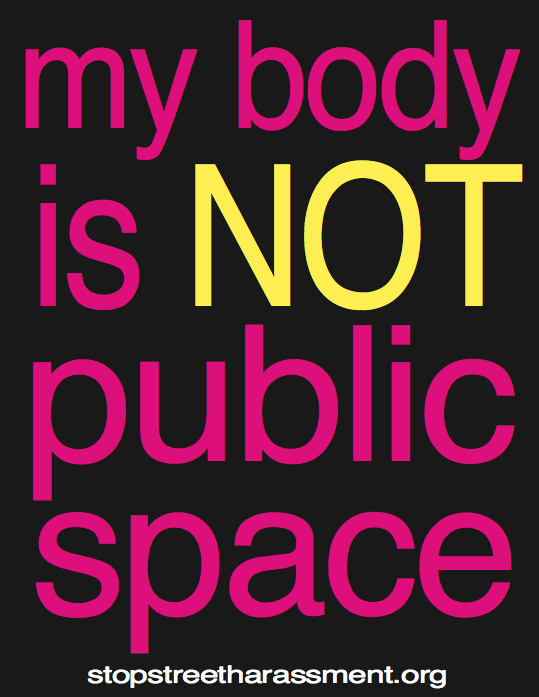 ~ en español ~
~ en español ~
Stop Street Harassment
We believe that street harassment impedes gender equality and must be taken seriously. Because street harassment is often an invisible problem (especially to people in power) and it is dismissed as being a “minor annoyance,” a “joke,” or the fault of the harassed person, our primary focus right now is simply to document the problem and demonstrate why it’s a human rights violation that must be addressed.
What We Do:
Direct Service:
In July 2016, Stop Street Harassment launched a national street harassment hotline in partnership with the Rape, Abuse & Incest National Network and Defend Yourself. It is offered from 12 pm to 12 am ET, in Spanish and English, with both phone and online options. Call toll-free: 855-897-5910.
Public Education:
Online Resources: The SSH website is the go-to resource for information about street harassment, including prevalence statistics, tips for dealing with harassers, information about street harassment and the laws, and how to be a male ally. Individuals from more than 30 countries submit their street harassment stories for the SSH blog and relevant news and activism is featured on the blog, too.
Correspondents Program: During four month cohorts, up to 15 correspondents from around the world contribute monthly articles about street harassment in their communities.
Research: In June 2014, SSH released a national study on street harassment that includes the findings of a statistically significant 2,000 person survey. In 2018, we will work with GfK and Raliance on a new national survey about all forms of sexual abuse across all the arenas where they occur.
Previously, SSH’s founder Holly Kearl conducted two online surveys for a master’s thesis and then a book.
Media: Board members regularly give media interviews on the topic and write articles for outlets like Washington Post, New York Times, Guardian, Huffington Post, Ms., and Women’s Media Center.
Books: Founder Kearl wrote some of the only books on the subject including Stop Street Harassment: Making Public Places Safe and Welcoming for Women (Praeger, 2010) and Stop Global Street Harassment: Growing Activism Around the World (Praeger, 2015).
Talks: SSH board members regularly give talks on street harassment on college campuses, in high schools, and to community groups. They’ve also testified about street harassment before the New York City, Philadelphia, and Washington, D.C. City Councils and presented at numerous conferences.
Community Mobilization:
International Anti-Street Harassment Week: Each spring, SSH organizes groups and tens of thousands of people around the world to take action against street harassment in their community during International Anti-Street Harassment Week. The 2017 week was held from April 2-8 (read the wrap-up report). The next awareness week will take place April 8-14, 2018
Safe Public Spaces Mentoring Program: Since 2013, through the Safe Public Spaces Mentoring Program, SSH works with groups worldwide to advise them on local anti-street harassment initiatives. Each group receives a small amount of funding from SSH to offset their expenses.
Toolkits: SSH provides resources for people who want to take community action.
Washington, D.C. Activism: SSH is based in the Washington, D.C.-area and has led or co-led various initiatives there. Along with Collective Action for Safe Spaces, SSH is part of a task force that works with the Washington Metropolitan Area Transit Authority on addressing sexual harassment on the Metro trains and buses. The most recent update was a third wave of PSAs posted across the Metro station in 2016 and 2017. In December 2015, two SSH board members testified at the first-ever DC city council hearing on street harassment.
Image by Amy M
